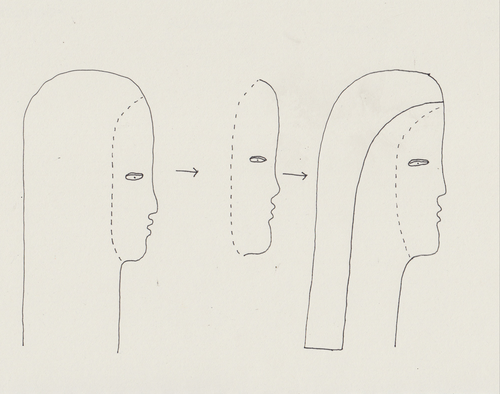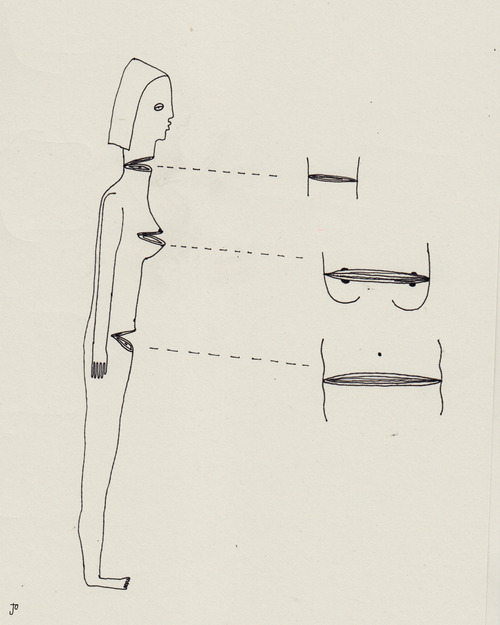
Illustrations by Josephine Demme
In this series five different writers talk to one writer about five (or more) of his different books. In this second interview, Matt Bell talks to Brian Evenson about The Open Curtain. Read the first interview with Colin Winnette.
Matt Bell in Conversation with Brian Evenson
The Open Curtain was the first of Brian Evenson’s books I read, after hearing Dan Wickett of Dzanc Books and Aaron Burch of Hobart gush over it at a post-reading get together in Ann Arbor, shortly after the book’s release in 2006. I can remember much of their conversation focusing around the book’s third part, “Hooper, Amuck,” and for good reason: It’s a third act that rearranges and reimagines much of what came before, reopening the book’s mysteries in one of the finest refusals of easy resolution I’ve ever seen. Reading The Open Curtain rearranged what I thought novels were capable of, what I thought I wanted from endings, and reading the rest of Evenson’s body of work offered similarly disorienting and entrancing experiences. At AWP in 2009, Evenson gave a talk as part of a panel on “Truth and Consequences in Non-Realist Fiction” where he shared an anecdote about one of the best compliments he’d ever received about his fiction: “Someone wrote to tell me that after reading one of my books he woke up in the middle of the night and went into the bathroom and turned on the light and found he could not recognize himself in the mirror. You could argue that this is simply an indication that you shouldn’t read certain kinds of fiction before bed, but it resonated for me in that that same questioning of, and loss of, self is something that I experience every time I write.” There are many such lovely and wounding and transformative losses of self in Evenson’s work, and I was grateful to get to talk to him about how the ones in The Open Curtain came to be and about how that novel paved the way for the books that followed.
—Matt Bell
I. THE ONES THAT CAME BEFORE
MATT BELL: The Open Curtain was published in 2006, and was (I believe) your seventh book and second novel. Since then, if I’ve got my count right, you’ve published two other novels and two short story collections under your own name, plus four books as B.K. Evenson, plus eight works of translation, by Christophe Claro, Manuela Draeger, and others. That’s an incredible five years of literary productivity, and I wonder if it makes The Open Curtain seem longer ago for you than it was. The time between The Open Curtain and now isn’t necessarily enormous, but the art distance between them is sort of staggering: I’m having a hard time thinking of a literary writer who’s produced more strong work in such a short time. There’s a similar effect for me as a reader: The Open Curtain was the first novel of yours I read, and even though I’ve read it twice since there’s still a sense in which it’s my “first” Brian Evenson experience, with all the rest of your writing following.
How do you see The Open Curtain, when you look back at it? Do you have a sense of how it was different than the work that came before it, or how it might have anticipated what came after?
BRIAN EVENSON: Well, it’s a little tricky in that even though The Open Curtain came out in 2006 it was finished in 2004 and it was something I’d been working on for almost five years before that. It’s the book I’ve worked on the longest, and really does span a time when my work was changing and developing, when I was becoming more open to genre, when my narratives were becoming fuller and more developed, where I was starting, I think, to complicate the minimalist gestures of my earlier fiction with something else. And so, I was working on it when I was also working on The Wavering Knife, for instance, and I think the fact that that book ended up winning an International Horror Guild prize opened up some doors for me with The Open Curtain. The positive reception in the genre world that The Brotherhood of Mutilation (the first half of Last Days) got in 2003 also was important. Both those and several other things were instrumental in terms of changing my sense of what I was able to do as a writer, and I think that The Open Curtain began as one sort of book and only could come to its own after I’d really changed both as a human and as a writer.
The Open Curtain was also something I thought of as a book that would teach people how to read my earlier books and it did something that I hadn’t done to that point: It has two at least relatively straightforward sections followed by a third that cracks open the reality so far created. It took me a long time (literally years) to come up with the recursive gesture that I use in the first several chapters of that final section, but that, I think, ended up opening something in terms of the fragmenting of reality that would end up being important both in the short fiction I’ve done since and in Immobility. I think The Open Curtain is the book I’ve learned the most doing, and definitely an important transitional moment for me.
MB: I’m interested to hear you say you wanted The Open Curtain to teach people how to read the earlier books, both because I’m curious what they’d been missing, and also because I think it’s interesting to consider the role of the writer in molding the reaction of readers over a body of work. What had readers gotten wrong about the earlier books? Was there any part of this desire that stemmed from your own changing understanding of the previous works?
BE: It wasn’t that readers had gotten anything wrong, only that some readers had a difficult time figuring a way into the work, or were repulsed by the violence, or came to the work, because of what they’d read about me in reviews, with preconceived notions of what they were going to read. I think the idea I had—and I didn’t have this when I began the book, only once I was in it—was that the book would mimic being relatively straightforward and then would get weirder as it went, and would finally crack open with the third section. I hoped that I’d bring certain sorts of readers in with the early pages and then gradually complicate things so that they were entering into a very different literary space almost without knowing. That seems to have worked, since that book was a finalist for the Edgar Award. The way I used to talk about the book that would become The Open Curtain when I was in the very early stages was that I wanted to write a book that was a series of three novellas, each of which would make you reconsider the ones that came before, each of which would in some senses erase or destroy what came before it so that you’d be left at the end with nothing, not knowing exactly what had happened to you. It doesn’t do that exactly, but it makes some gestures toward it, and the beginning of part three does it in lesser form. Jeff Vandermeer’s Southern Reach trilogy does in fact do this, being a series of three novels, each of which makes you question what you thought you knew from the first one.
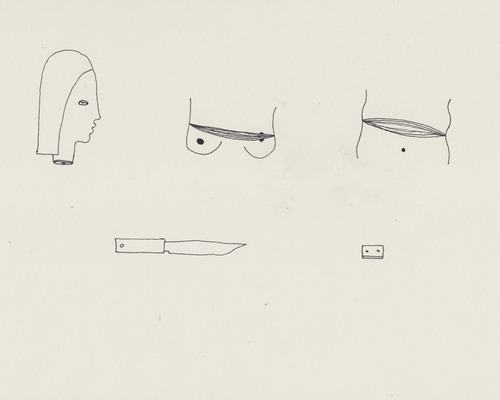 II. CHAPTER ONE
II. CHAPTER ONE
MB: The Open Curtain is divided into three parts: “Rudd, Parsed,” “Lyndi, Adrift,” and “Hooper, Amuck.” In an interview with Laird Hunt—a writer I’m always glad to see you in conversation with, because your work and his are so strongly linked for me—you mentioned that you originally conceived of the book as “a series of three novellas, each of which would, in some sense, erase or call into question the reality of what came before.” What’s interesting is that I remember reading somewhere else that you wrote several different versions of the third part before arriving on the content of “Hooper, Amuck.” It’s such a surprising and powerful ending, one that seems impossible to have planned your way into—it feels absolutely discovered, not manufactured from a blueprint—and I’m curious what the actual process of arriving there was like. This has been one of the elements of this book I’ve remained most curious about over the years, and I wonder if you’d be willing to talk about the other final acts that might have concluded the book: Are you willing to share some of the other ways the book might have ended? How did you sort through the other possibilities to arrive at “Hooper, Amuck”?
BE: It was a long and painful process to arrive at that ending. I thought I could trick myself into writing a long book by thinking of each of its three sections as a novella. That worked very well for the first two sections, but then suddenly I hit that third section and realized it had to not only work on its own but also had to bring together the book as a whole. I wrote several different endings and discarded close to a thousand pages of a number of drafts, little pieces of which went on to feed other projects (part of one of those endings ended up being a big part of the last half of my story “Grottor,” for instance). But it just wasn’t working.
At one point, I thought I was going to have to abandon the novel, and did give it up for almost a year, but then a couple of things happened that made it so I could get to that final section. One was that I was reading Steve Erickson’s work and thinking a lot about it, and that opened up all sorts of possibilities for interspersed realities. And I read for the first time Peter Straub’s story “The Buffalo Hunter.”
Finally, someone sent me a postcard from New York (which is replicated in the text, I think), and as small as that was it made something click as well. But the gesture that makes that final section distinctive, the gesture of restarting, was really something that happened at the very moment I was struggling to write it. I finished writing my latest draft of the first chapter of “Hooper, Amuck” in longhand and got out a new blank page to start chapter two, and then wrote again, almost on a whim, on the top of that page, “chapter one.” That changed everything. As soon as I did that everything opened up and I could see where it was all going and knew I’d be able to finish the book and that I’d be happy with it.
MB: I obviously recognized the repetition of those three first chapters the first time I read The Open Curtain, but somehow I missed that they were all explicitly numbered “1” until the second time through, a few years ago, when I read the eBook instead of the physical version. (An option that wasn’t available, of course, when the book was first published.) But then, because it’d been a while since I read the book, I at first thought the repeated chapter number was a glitch, a coding error in the eBook—until, of course, I started to read on and saw the shifts in the text as the scene rebooted. While I think these stacking confusions have more to do with my missing something as a reader (more than once!) than anything to do with medium, it also reminds me of the essay you wrote for The Collagist called “Doing Without,” which talked in part about the differences in other writers’ books you’d experienced moving from the eBook to the physical. I’m wondering if a couple years of reading eBooks has had any effect on what you want out of your own work: Are there gestures or techniques that you’re interested in developing or trying out, knowing that readers are going to experience a story slightly differently depending on what medium they read it in?
BE: I think misreading is a big part of reading, the way in which the level of attention you’re paying can lead to some interesting residue. And of course as we’re reading all the possibilities that the author didn’t pursue but that we think about end up being carried along with the story as well, as a kind of undercurrent. And yes, eBooks, partly because they shift format, do change your relationship to texts that you thought you knew. As I talked about in “Doing Without” the way you can shift the format of the eBook, enlarging and shrinking the number of words on the page, etc., does really change your relationship to the work. I was reminded of this recently in reading Lautréamont’s Les Chants de Maldoror. The e-edition I had didn’t have any of the French accent marks, which meant I had to think them in. I know French well enough that I could do that, but it made for occasional moments of strange misreading, where I had to recoil and realize, no, I mentally added an accent where there shouldn’t have been one and thus substituted one word for another. But, in addition to that, it gave the text a strange flatness and a different speed than it has when it’s written in a non-stripped-down text.
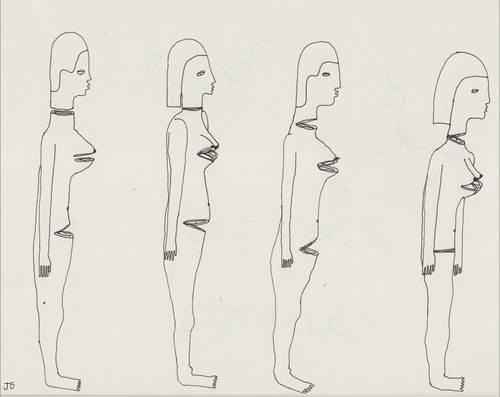
MB: In your afterword to the novel, you took up Jon Krakauer’s suggestion in Under the Banner of Heaven that “violence… has always been a largely suppressed and unacknowledged part of Mormon culture,” and obviously The Open Curtain works in different ways to, in your words, speak “in detail about the relationship of Mormon culture to violence.” And while The Open Curtain certainly seeks to explore this link in a particular Mormon context, it seems to me like one of your broad concerns has always been about the effects various kinds of violence on the individual psyche and the community, in a variety of different contexts. I’m curious if you feel that you’re closer to answering the questions you’re asking the reader to consider about the uses and consequences of violence, ever since Altmann’s Tongue: Are different novels and stories new ways of framing this and other questions you’re obsessed with, or are they in different ways the answers themselves?
BE: I think what’s happened is that my attempts to answer certain questions have led me to other related questions. I think that Altmann’s Tongue really was the book of mine that was the most interested in thinking about violence. But it did so by putting characters in a position where they didn’t seem to be responding “properly” to violence going on around them, calling on the reader (at least in theory) to fill that ethical void by imagining their own responses into it. My interest in the relationship of violence to the individual led me to think about the relationship of the individual to the group and that in turn has led me to ask questions about what it means to be human. But all of those issues, whether directly or indirectly tied to violence, are for me questions about ethics and responsibility, about what our choices do to us, about what the relationship is between individual actions, group pressure, and self-definition, about how we interact with the world around us.
At this stage of my life, I’m very skeptical of formal communities and the effect they have on individuals. There’s something that happens with institutions in particular where people within them sometimes take on an institutional or corporate mindset and make choices that have little to do with what they think is right but that they, somehow, feel driven to make. I’ve seen that in religious contexts (Mormonism), but I’ve seen that just as strongly in academic contexts. I think it takes effort to remain a thinking individual.
MB: In my own experience, I think one of the most insidious things about this kind of institutionalization is the way in which it seems that we’re most often only aware of this kind of decision-making in hindsight. We want to think of ourselves as individuals, with free will, and yet it seems like, through every age and advancement system of belief and government, we keep finding new ways in which we are not, in fact, as free as we would like to believe. And yet what other ethical response can there be but to make that effort to remain, as you say, a “thinking individual”?
BE: I don’t know that there’s any other ethical response we can make, but there is something about acknowledging that it’s an effort, that it doesn’t come automatically. A great part of what we interact with on a day-to-day level pushes against that.
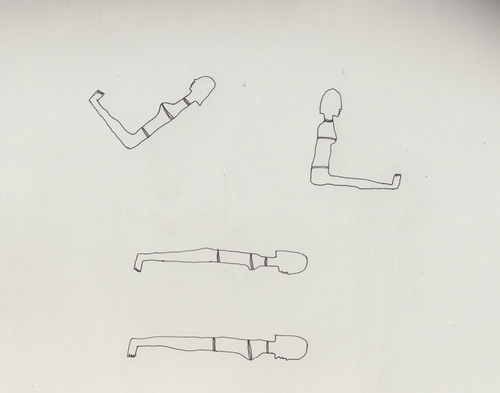
III. A CRYSTAL
MB: I’m interested in another change in your stories, that maybe isn’t as dramatic in your mind as it is in mine, but also seems maybe related: It seems to me that—perhaps starting with The Open Curtain, and Lael and Rudd—some of your protagonists have skewed younger over the past few years. I might be cherry-picking my examples—I’m thinking especially right now of the characters in “Younger” and “Girls in Tents” and “Windeye,” although certainly there are others. But when you say you’ve been thinking through this skepticism with formal communities and their effects, I can’t help but wonder if some of the move toward younger protagonists isn’t a way to start the story at an earlier point of indoctrination into one worldview or another—even just adulthood. But maybe I’m reading too much into things, or remembering too small a section of your work. Is this something you’ve been conscious of, or am I making things up?
BE: I think that probably has something to do with my having children and becoming really interested in the way that children view the world, how differently they see it from the way adults do. What also happens when I start writing in that mode, which is a mode that I love, is that I end up peppering the stories with a lot of details from my own childhood. For instance, my sister and I used to take turns locking one another up in the bottom compartment of the toy chest that we had, which ends up coming up in “Windeye.” The stories end up feeling more personal to me as a result, and I think that gives the stories a different sort of affect, a different sort of electrical charge. There’s usually so little that’s autobiographical in my writing that it surprised me when it started happening in that context. The Open Curtain does that to a large degree, with a lot of minor details from my growing up that are mixed in with a lot of imagined and strange details, and with my hometown reimagined in it from scratch, in the way that I remember it being when I was a kid. I don’t think ultimately I’m skewing younger—the book of stories I’ve just finished has mostly stories with adult protagonists—but that’s definitely an important mode for me.
MB: You mentioned that you attempts to answer certain questions have led you not necessarily to answers but to other questions. It seems to me that one of the reasons we have to write so many books is that it’s impossible to explore everything we want to in any given book, although I know that I certainly try. One of the hard parts about revision is, I think, finding the balance between the total ambition of a messily inclusive first draft and the more polished final draft, which tends to exclude much of what might have been in order to make something tighter, more focused. Is there a particular question or concern that you feel like you haven’t explored yet, that might drive future work?
BE: I sometimes feel like my whole career has been taking a set of concerns that I’ve had literally since I wrote my first story at age twelve and examining different facets of them. It’s like I have a crystal in my hand and I just keep turning it and turning it and seeing things about it that I kind of saw before but didn’t know exactly how to articulate. But it’s also like if I turn that crystal enough suddenly it’s not a crystal I’m turning at all but, say, a bicycle, and I’m not even sure what it’s doing in my hand or why I’m holding it or how I can hold it. That’s when interesting things start to happen for me, when reality goes strange or the work I’m doing starts to feel like a hallucination of some sort. At this point I’ve published enough books and stories to know that anything I don’t talk about fully in a particular story is something that I’ll circle back to later—probably in more interesting ways once it’s been digested by the buried parts of my mind—and so I’m much more likely to opt for focus and clarity and tightness rather than inclusiveness pretty early on. My first drafts have become more and more polished as time has gone on, and rarely does something change structurally after that draft (though every once in a while it does). But things tighten, sentences expand and contract, I edit for sound, for rhythm, etc.
In terms of particular concerns that I haven’t explored yet, that’s such a difficult question in that usually I go into a project with only a vague sense of how my concerns are shifting/might shift—if I know too well where I’m going then, well, honestly I want to go somewhere else instead. It’s like the long story that appears in McSweeney’s 45, “The Dust.” When I started working on that, all I had was a name—Orvar—and the idea that something I’d touched on in another story (“The Oxygen Protocol”) had more to it. That was enough to start things, but couldn’t have let me predict where the story would go.
Right now, I find myself thinking a lot about the idea of grafting. Not plant grafting, but the idea of grafting on a limb or transplanting a head. And galvanism—the idea that you find in certain 19th and early 20th century novels that you could galvanize a dead body with electricity and bring it back to life. I may well do something soon with grafting and galvanism. But of course that isn’t that different from aspects of Dark Property, and it’s kind of the inverse of Last Days…
